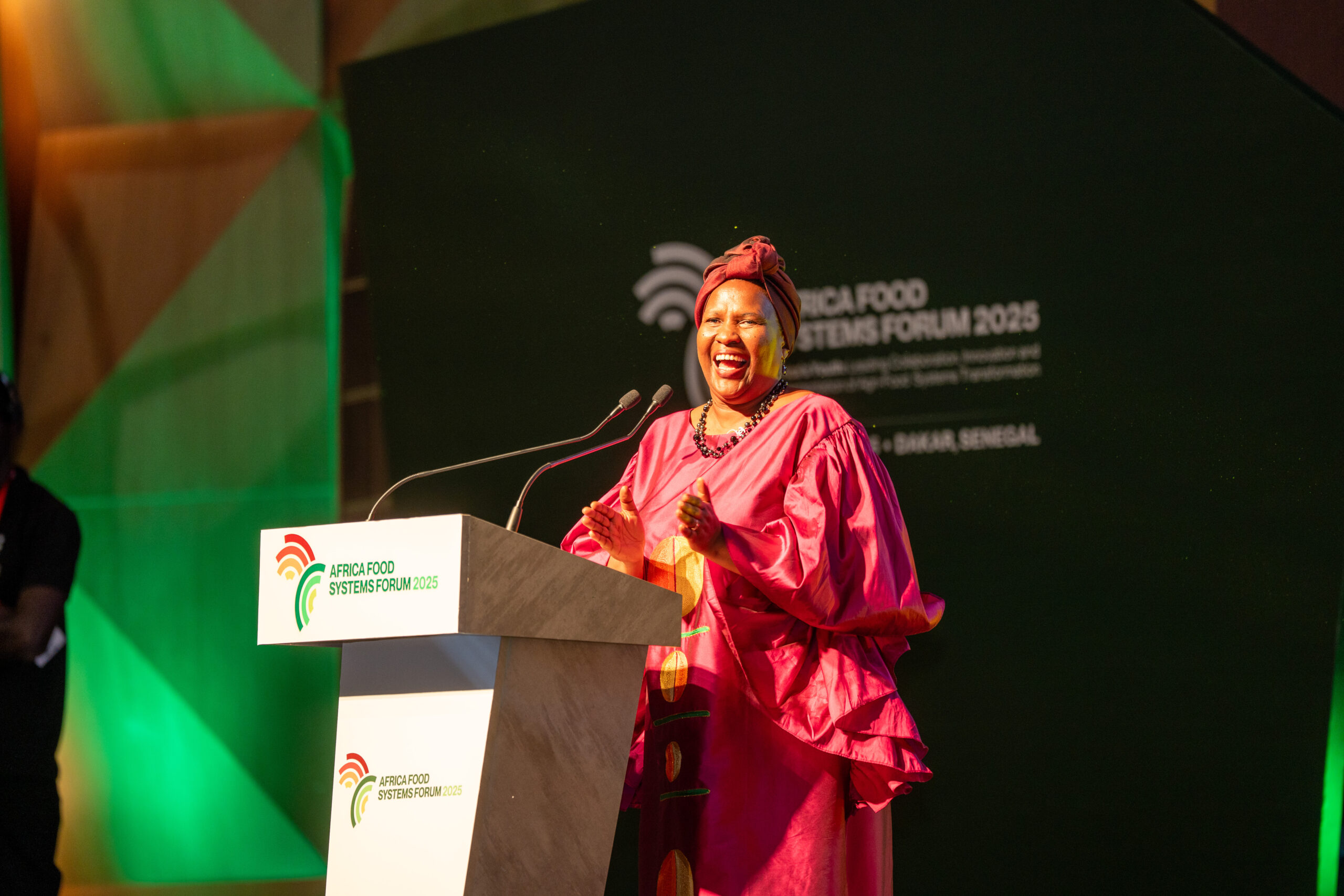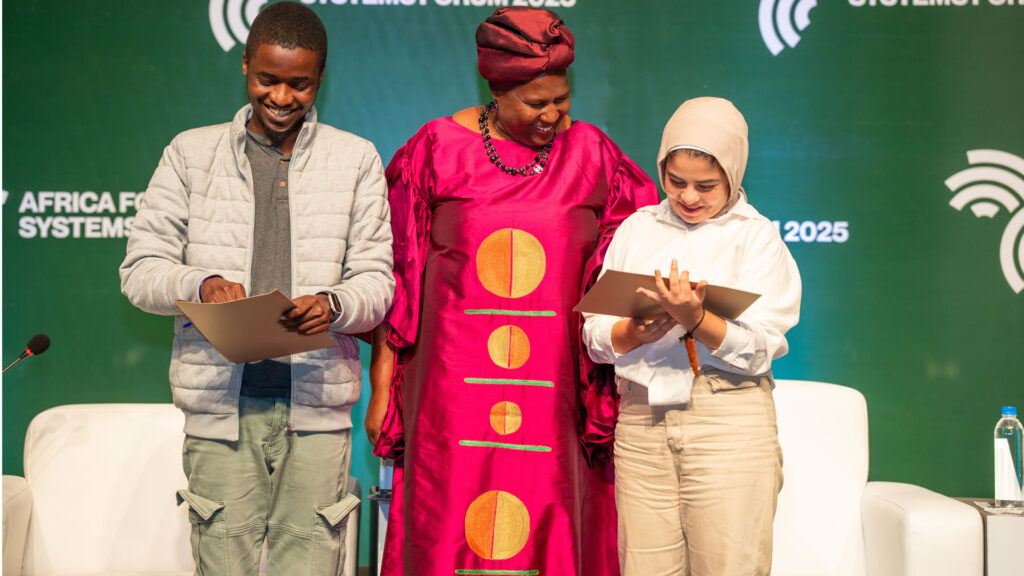Blogs
Africa’s Farms and Herds are Now Big Business – Reflections from the Africa Food Systems Forum in Dakar


Reading
Africa’s Farms and Herds are Now Big Business – Reflections from the Africa Food Systems Forum in Dakar
By Alice Ruhweza
I am back in Nairobi after spending a week at the Africa Food Systems Forum (AFSF) in Dakar. I can still feel Dakar’s soundtrack humming in my ears. Part Afrobeats, part market-day hustle, part start-up pitches. This year’s AFSF wasn’t your run-of-the-mill conference; it was a live studio session where farmers, scientists, bankers, youths, and ministers laid down tracks together. And the title of the soundtrack is “agriculture is not a solitary struggle. It is a thriving, modern business with real deal flow, real technology, real jobs, and real joy.”
You could feel the joy in the Youth Dome, which fizzed like a tech festival with demo pods, rapid-fire pitches, mentorship corners, and that buzzing optimism one only gets when young people believe the future is in their hands. These young people were not just talking apps; they were building businesses from climate-smart farming to digital finance to AI tools that answer farmers’ questions in their own languages. This last one really stayed with me: a farmer snaps a photo, records a voice note, and gets advice back in Wolof. (One of the main local languages in Senegal). This is what dignity looks like in digital form. Technology that meets people where they are and lifts them up.
This year the exhibition floor gave livestock its proper spotlight. From fodder to dairy to poultry and beef, and some very colorful birds, the conversations the booths, and one very powerful all-female panel put livestock at the center of value chains that feed families, power small industries, and open export markets. When Uganda talked beef and dairy, Somalia put fodder on the table, and Ghana ran the numbers on poultry, one could see how farmers move from surviving to thriving when the entire value chain is connected.
And because business needs capital, countries put on their best suits on and went to the “Deal Room”. Senegal, Liberia, Uganda, Zimbabwe, Nigeria, and Somalia pitched investment-ready ventures collectively aiming to mobilize investments in agrifood systems worth over USD $6 billion. This is not wishful thinking; this is pipeline. Investors are always looking for bankable and scalable projects and they saw both.
Which brings me to a theme I care about deeply: insurance for women-led businesses. Missing rains, droughts, floods, price shocks, illness, one bad week can undo a year’s work. One of the most exciting panels I attended was the one convened by AGRA to discuss women and finance. The panelists made a strong case for providing insurance to financial institutions so that they can be incentivized to lend to women owned businesses. The financing gap is still huge, around USD10 billion by recent estimates, but countries from Senegal to Ethiopia are proving that smart public policy can unlock private insurance cover and make credit cheaper and accessible down the line. Technical assistance for women-led SMEs was also a key topic of discussion. Suffice to say that these businesses must be supported to be investor-ready, including having proper records that would help them attract the kind of patient capital needed to get them to scale.
AGRA launched the Africa Food Systems Report 2025, an evolution of the long-running Africa Agriculture Status Report. Under the theme “Drivers of Change and Innovation for Food Systems in Africa”, the report marks a shift from tracking agriculture alone to taking stock of the entire food system, from production and trade to governance, nutrition, climate, and markets. The picture remains uneven, with hunger continuing to rise. The report argues that the future hinges on how countries harness innovation and change drivers, from smarter spatial planning and blended finance to stronger institutions and inclusive governance. It gives examples of how local processing can turn harvest surpluses into jobs and increased incomes, how trade corridors can connect food baskets across the continent, and how nutrition, climate resilience, and markets are inseparable in building food security. Finally, it argues, persuasively, that siloed solutions won’t cut it anymore. We need integrated approaches, backed by finance, to scale what works.
The forum was not just about events and networking. We also recognised innovators who are driving agrifood system transformation in Africa.
The Women Agripreneurs of the Year Award (WAYA) Grand Prize went to Mathildah Amollo of Kenya, whose company, Greatlakes Feeds Ltd, is rewriting the story of livestock nutrition. She was joined by a constellation of excellent innovators in their own right: Juliet Kakwerre Tumusiime (Uganda), Julienne Olawolé Agossadou (Benin), Roberta Edu-Oyedokun (Nigeria), Joyce Waithira Rugano (Kenya), and Onicca Sibanyona (South Africa), each of them proof that women’s innovation is rewriting Africa’s food future.
The Africa Food Prize (AFP), the continent’s preeminent recognition of individuals or institutions that are reshaping Africa’s food systems, was awarded to two remarkable scientists whose work is both a cultural correction and a scientific breakthrough. Professor Mary Abukutsa-Onyango from Kenya was recognized for her advocacy for indigenous crops and improved nutrition, while Dr. Mercy Diebiru-Ojo from Nigeria received recognition for her work on accelerating the production of disease-free planting materials for cassava and yam.
Significantly, there were concrete signals for investors. The UK announced a GBP 5 million partnership with AGRA to strengthen intra-Africa trade, a nod to the opportunity that sits in our fields and factories if we can connect them to global markets.
AGRA unveiled a package of partnerships designed to unlock private capital including Africa100, a catalytic initiative launched in partnership with the Africa Enterprise Challenge Fund (AECF), to catalyse support to the top 100 often-overlooked small and medium sized enterprises, (the “hidden middle”), that link farmers to markets, create rural jobs, and drive resilience. Other partnerships announced include the Southern Africa Poultry Initiative – transforming Poultry for Nutrition and Jobs, Poultry Feed Innovation Grand Challenge; and platforms intended to elevate the voices of Africa’s youth, partnerships with Global Citizen and Farm Radio, and the inaugural Africa Media Fellowship Award, intended to nurture the next generation of storytellers.
None of this happens at scale without policy to match the endeavor. That is why my call to action is for Governments, Private sector, Development Partners and all key stakeholders to double down on domesticating the CAADP Kampala Declaration; and putting in place the capacity, institutions and finance to achieve the CAADP targets which include: mobilizing USD100 billion, increasing agrifood output by 45 percent, cutting post-harvest losses in half, and tripling intra-African agri-trade by 2035. AGRA will continue to catalyse, facilitate, orchestrate and galvanise the entire ecosystem to work with Governments to translate these targets into bankable projects that deliver impact for small holder farmers from farm gate, to border post.
A big shout out to the hosts. Senegal rolled out their renowned “Teranga hospitality” with a side of grit. Honorable Mabouba Diagne, Senegal’s Minister of Agriculture, Food Sovereignty and Livestock took up office in February close to the same time I was joining AGRA as President. He and I made a silent pact that this AFSF would be our joint delivery. His team and the AFSF Secretariat put in 17-hour days to make sure this happened. That energy mirrored the whole week: roughly 5,600 participants from 106 countries, 149 exhibitors all pulling in the same direction. When a country works that hard to convene the continent, you leave with more than contacts; you leave with conviction.
The forum closed with a line I loved from Minister Diagne: he said the two accelerators for Africa are youth and technology. He is right. I would add a third accelerator that we saw everywhere in Dakar: belief. Belief that our food systems can feed, employ, and enrich; belief that a farmer’s photo and voice note can summon world-class agronomy advice; belief that women enterprises deserve to be insured and indemnified from risks; and belief that policy can keep pace with the hustle on our streets.
Youth aren’t waiting to be invited; they are building. Women aren’t asking for permission; they’re winning awards, running enterprises. Governments aren’t just issuing communiqués; they are pitching to investors and some are putting real money into biofortified school meals that not only boost attendance but also improve nutrition. This is what it looks like when agriculture stops being treated as charity and shows up on the balance sheet as a business.
Now, our task is to keep composing the track we started in Dakar, tighten the rhythm of policy, turn up the volume on investment, and let youth and women carry the chorus. If we do this, agriculture will not only feed Africa. It will power the world.
